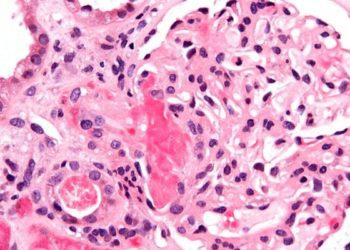Particulate foods not associated with incident diverticulitis in women
1. In this prospective cohort study, dietary intake of peanuts, nuts, and seeds was not associated with increased risk of incident diverticulitis among women.
2. Healthy dietary patterns were associated with reduced risk of incident diverticulitis.
Evidence Rating Level: 2 (Good)
Study Rundown: Prevention of diverticulosis and diverticulitis has historically involved avoiding particulate matter, such as nuts, seeds, corn, and popcorn, in the diet. However, a 2008 study suggested that regular intake of particulate matter did not lead to diverticulitis; nonetheless, that study was not replicated and did not include women, even though women are disproportionately affected by diverticulitis. This study therefore aimed to determine whether dietary intake of nuts, seeds, and corn was linked to increased risk of diverticulitis among women. Analyzing data from over fifty-thousand women, the study did not detect any significant difference in diverticulitis risk between the highest and lowest quartiles of peanut, nut, and seed intake. However, the highest quartile of corn intake did have a lower risk of diverticulitis compared with the lowest quartile. Comparing four different diet patterns, the study also found inverse correlations between the highest quartiles of the Dietary Approaches to Stop Hypertension (DASH) diet, Healthy Eating Index (HEI) score, Alternative Healthy Eating Index (aHEI) score, and the Alternative Mediterranean (aMed) diet and incident diverticulitis compared with the lowest quartiles, which was consistent when adjusted for dietary fiber intake. Body mass index, age, and menopausal status did not modify the overall findings. Similar but less consistent associations were found between dietary patterns and risk of diverticulitis requiring surgery or hospitalization, while no association was found between dietary patterns and risk of diverticulosis. The generalizability of this study was limited by an inability to assess causation; possible underreporting of diverticulosis; and possible bias from unmeasured confounders. Overall, this study found that that dietary intake of peanuts, nuts, and seeds was not associated with higher risk of diverticulitis in women, but maintaining a higher-quality diet was associated with a lower risk.
Click to read this study in AIM
Relevant Reading: Nut, Corn, and Popcorn Consumption and the Incidence of Diverticular Disease
In-Depth [prospective cohort]: This prospective cohort study aimed to assess whether dietary intake of particulate matter and dietary patterns are associated with risk of incident diverticulitis among women. Data were drawn from the Sister Study, which enrolled 50,884 women aged 35 to 74 years from the United States and Puerto Rico between 2003 and 2009. The study identified 1531 incident cases of diverticulitis over 415,103 total person-years of follow-up; 58% of women with diverticulitis had at least 2 episodes, while 30% were hospitalized at least once for diverticulitis and 14% had surgery for diverticulitis. Women with diverticulitis were more likely to identify as non-Hispanic White or Hispanic, be current or former smokers, engage in heavy alcohol use, have a BMI that fell within overweight or obese categories, and be post-menopausal or use menopausal hormone therapy. There was no difference in risk of incident diverticulitis between the highest and lowest quartiles of peanut, nut, or seed intake (adjusted hazard ratio [aHR], 1.07 [95% CI, 0.91 to 1.25]) or fresh fruits with seeds intake (aHR, 1.06 [95% CI, 0.90 to 1.24]). However, the highest quartile of corn intake did have a lower risk of incident diverticulitis (aHR, 0.86 [95% CI, 0.74 to 0.99]) compared with the lowest quartile. These findings were consistent when stratified by BMI category (< 25, 25 to 29.9, ≥ 30 kg/m2), age (< 55 years, ≥ 55 years), and menopausal status at enrollment. The study also found inverse correlations between the highest quartile of the DASH diet (aHR, 0.77 [95% CI, 0.65 to 0.90]), HEI score (aHR, 0.78 [95% CI, 0.66 to 0.91]), aHEI score (aHR, 0.81 [95% CI, 0.69 to 0.95]), and the aMed diet (aHR, 0.91 [95% CI, 0.78 to 1.06]) and incident diverticulitis compared with the lowest quartiles. Overall, these results demonstrated that dietary intake of peanuts, nuts, and seeds was not associated with heightened incident diverticulitis risk, whereas healthy dietary patterns were linked to reduced risk.
Image: PD
©2025 2 Minute Medicine, Inc. All rights reserved. No works may be reproduced without expressed written consent from 2 Minute Medicine, Inc. Inquire about licensing here. No article should be construed as medical advice and is not intended as such by the authors or by 2 Minute Medicine, Inc.







